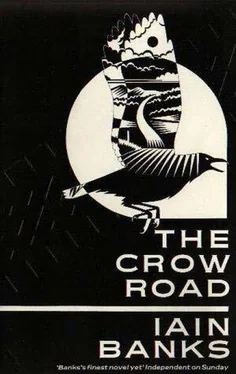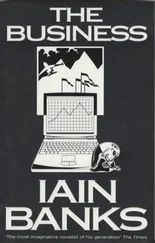Iain Banks - The Crow Road
Здесь есть возможность читать онлайн «Iain Banks - The Crow Road» весь текст электронной книги совершенно бесплатно (целиком полную версию без сокращений). В некоторых случаях можно слушать аудио, скачать через торрент в формате fb2 и присутствует краткое содержание. Год выпуска: 1992, Жанр: Современная проза, на английском языке. Описание произведения, (предисловие) а так же отзывы посетителей доступны на портале библиотеки ЛибКат.
- Название:The Crow Road
- Автор:
- Жанр:
- Год:1992
- ISBN:нет данных
- Рейтинг книги:5 / 5. Голосов: 1
-
Избранное:Добавить в избранное
- Отзывы:
-
Ваша оценка:
- 100
- 1
- 2
- 3
- 4
- 5
The Crow Road: краткое содержание, описание и аннотация
Предлагаем к чтению аннотацию, описание, краткое содержание или предисловие (зависит от того, что написал сам автор книги «The Crow Road»). Если вы не нашли необходимую информацию о книге — напишите в комментариях, мы постараемся отыскать её.
The Crow Road — читать онлайн бесплатно полную книгу (весь текст) целиком
Ниже представлен текст книги, разбитый по страницам. Система сохранения места последней прочитанной страницы, позволяет с удобством читать онлайн бесплатно книгу «The Crow Road», без необходимости каждый раз заново искать на чём Вы остановились. Поставьте закладку, и сможете в любой момент перейти на страницу, на которой закончили чтение.
Интервал:
Закладка:
Dad had left over a quarter of a million pounds, after the government had taken its cut.
My share came to well over forty thousand smackeroos. The likelihood was that for the next few years at least, I'd bank about fifteen grand per annum, which might or might not tail off, abruptly or gradually, depending on how well dad's stories held up against the tests of time… not to mention the likes of Thomas the Tank Engine, the Teenage Mutant Ninja Turtles, and whatever other delights the future of the children's fiction market held.
Anyway, suddenly I was, if not quite within range of the mountains of Rich, certainly well into the foothills of Comfortable. It entirely made up for the discovery, a few days earlier, that the estimate I had made of my chances of passing my final exams had been considerably more accurate than any of the conclusions I had drawn in the course of them. I had distinguished myself by failing, a result the department prided itself on happening only rarely.
My initial reaction had been to cut my losses on the honours front and see if I could take an MA instead; a re-sit would mean a whole extra year at university. But that sentiment had only lasted for a day. In the turmoil of feelings and fortunes dad's death had produced, the prospect of another year's study, with the framework and time scale that would provide — especially if I applied myself, as I thought I would now be able to — seemed suddenly a relief rather than a chore.
At any rate I still had a little time to decide what to do, and the money would make the choice easier. A return to Glasgow need not now also mean a return to the joys of sharing a flat with Gav, Aunt Janice, and their sonically extrovert passions.
We stood, the three of us, mum, Lewis and I, on the pavement outside the Main Street offices of the lawyer Blawke, in Gallanach.
I was still thinking, Forty grand? and trying not to look too stunned. Mum was slowly putting on her black leather gloves.
Lewis and I looked at each other.
Lewis wasn't doing too badly himself, down in London, but he too had looked pretty surprised when Blawke told us the sums that were heading our way. Mum hadn't really shown any reaction — she'd just thanked the good lawyer politely and asked after his wife and family.
"Fancy a drink?" Lewis said to me. I nodded. I felt slightly faint. "Mum?" Lewis said.
She looked round at him, small and neat in her dark blue coat. It was a bright, warm day and I could see the silver in her dark brown hair. She looked so delicate. I felt like I was in my early teens again, mum seemingly getting shorter and shorter with each season that passed.
"What?" she said. I found myself sniffing the air; I was downwind, but all I could smell was Pear's soap and Lewis's Aramis. Mum seemed to have stopped wearing perfume.
"I think a drink, to steady our nerves," Lewis said to her.
"Aye," mum said, looking thoughtful. She gave a thin wee smile and nodded at us. "Aye, he'd have liked that."
And so we went to the Lounge of the Steam Packet Hotel, looking out over the tourist-crowded pier and the packed car park. The water was bright amongst the hulls of the moored yachts, and the Mull ferry was a black shape in the distance, heading away.
We drank vintage champagne and fifteen-year-old malt. I suspected dad would have approved.
Lewis had to head back to London that night. Mum and I had been busy for a week, tidying up all the loose ends an unexpected death leaves, especially when the deceased is somebody as socially and professionally entangled as dad.
Then mum had gardened while I'd sorted through less urgent papers — printing out everything on the disks, searching out all the of the stuff on stories, and sending it — or copies — to dad's literary executor, his editor in London. I had become modestly PC-computerate (Ashley had given me a grounding in the basics, though PCs were not really her field). I'd even learned how to change the toner cartridge in the photocopier without making a mess.
On one of the earliest computer disks dad had used, dated shortly after he'd finally joined the computer age and bought the Compaq, in 1986, I found copies of some of Rory's poems; dad must have been putting them onto the system from the drafts Rory had left. I printed those out. It didn't look like dad had been very impressed with the poems, or he'd presumably have transcribed them all onto the computer (they weren't on the hard disk or backed up onto another floppy either — another indication my father had regarded them as relatively unimportant), but at least I again had something Rory had written. I was still hoping more of Rory's papers would surface somewhere.
Dad's old diaries turned up in a cardboard box at the back of a cupboard. Mum glanced at them, handed them to me. They looked pretty boring, frankly: "M&I to Gal; shops, prom walk, back; did VAT." and "me Glasg car 1040 LHR 1315 F'furt; late, missed others, tel. L'gair Din in room, TV" were two of the more exciting and informative entries for last year. Dad's ideas books — A4 pads, usually — were where the interesting stuff was. We'd look at the diaries later.
Then, one day, at the back of dad's oldest and most decrepit falling cabinet, I'd discovered treasure. It was in the form of three jatty, falling-apart Woolworth folders stuffed with old exercise books and shorthand-pads, bulging manila envelopes stuffed with tickets, timetables and assorted scraps of paper, as well assorted sheets of paper of various sizes, some stapled together, most loose, some typed and some hand-written, and all the work of Uncle Rory. There was one sealed envelope, too.
Here were all the poems I'd seen before and more, typescripts of all the travel pieces, and the progenitor of Traps; Rory's India journal; tattered, battered, stained and torn and littered with doodles and little hand-drawn maps and sketches. A fold-out map of India was stapled to the inside back cover of the first exercise book, and on it Rory's spastically erratic route round the country was picked out in blue Biro. The back cover of the second book was covered with little faded train and bus tickets, attached to the cheap, fibrous blue paper with rusting staples. The last exercise book had only one ticket stapled to the rear cover: Rory's Air India ticket home. Some of the pages were stained with what looked like saffron, and I swear one book still smelled of curry.
I'd sat down there and then and begun to read, flicking through the thin, brittle pages of the journal, smiling at the spelling mistakes and the awkward, amateurish drawings, looking for passages I remembered.
I'd looked at the other stuff too, and found one play — another martial yarn about death and betrayal, and apparently nameless — which contained not only the passage about the fate of soldiers which I'd read in the delayed train back in January, in the rain on the line at the back of Crow Road, but which also ended with the lines I'd heard first a few weeks before that, in Janice Rae's flat. In Janice Rae's bed, in fact.
And all your nonsenses and truths, I'd read.
"Your finery and squalid options," I'd said quietly, to myself.
Rory's climax-delaying mantra was all there, right down to the last, three-word line. But, given the situation the narrator was in at that point, the lines took on an extra resonance, and an irony I had not been able to appreciate before. The section was circled with red ink and under that last line was written a note in large letters:
USE FOR END CR.
Gradually though, as I'd looked at it all, my feeling of quiet elation faded as I realised there seemed to be nothing else in any of the folders that seemed to relate to Crow Road. All I found was one cryptic note scribbled in pencil on the inside flap of what looked like the most recent of the three tatty files. It said:
Читать дальшеИнтервал:
Закладка:
Похожие книги на «The Crow Road»
Представляем Вашему вниманию похожие книги на «The Crow Road» списком для выбора. Мы отобрали схожую по названию и смыслу литературу в надежде предоставить читателям больше вариантов отыскать новые, интересные, ещё непрочитанные произведения.
Обсуждение, отзывы о книге «The Crow Road» и просто собственные мнения читателей. Оставьте ваши комментарии, напишите, что Вы думаете о произведении, его смысле или главных героях. Укажите что конкретно понравилось, а что нет, и почему Вы так считаете.












